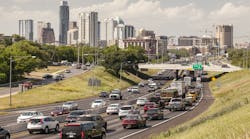This probably will not come as a shock to most of you, but the American Transportation Research Institute's recent Cost of Congestion study found that traffic congestion on U.S. highways added $94.6 billion of costs to the trucking industry in 2021 and resulted in a loss of 1.27 billion hours of productivity.
ATRI reminds us that in addition to adding direct costs in driver compensation, fuel, and repair and maintenance, it also "generates indirect and/or social costs such as supply chain disruptions, inefficient use of fuel, and diminished air quality."
The report also concluded that "in 2023, 6.793 billion additional gallons of diesel were wasted due to congestion."
See also: Pick your poison, truckers: Flat VMT fee, efficiency-based, or weight-based?
Congestion occurs for several reasons, not the least of which is the condition of our nation's roads and bridges. The health of U.S. roads is partially the result of the fact that the fuel tax has not been raised since 1993, resulting in decreased spending on infrastructure improvements.
Congress did pass a massive infrastructure spending bill that hopefully will allow improvements to be made that will eliminate some of the congestion. One good way to put those infrastructure dollars to work is to improve areas where bottlenecks and congestion occur regularly.
However, even if we address these and make other improvements with funds recently earmarked for infrastructure improvement, we still need to address the elephant in the room: How will the Highway Trust Fund, which finances most federal government spending on highways, be funded in the future?
Today, it is funded via a federal fuel tax of 24.4 cents per gallon of diesel and 18.4 cents per gallon of gasoline. As we move into a future where fewer trucks will be operating on diesel, where will the funds for highways come from? We need to address that question before we get too deeply into the zero-emission movement of freight.
I don't have the answer, but we need to begin the discussion today. If we wait, our traffic congestion problem will cost us even more.




